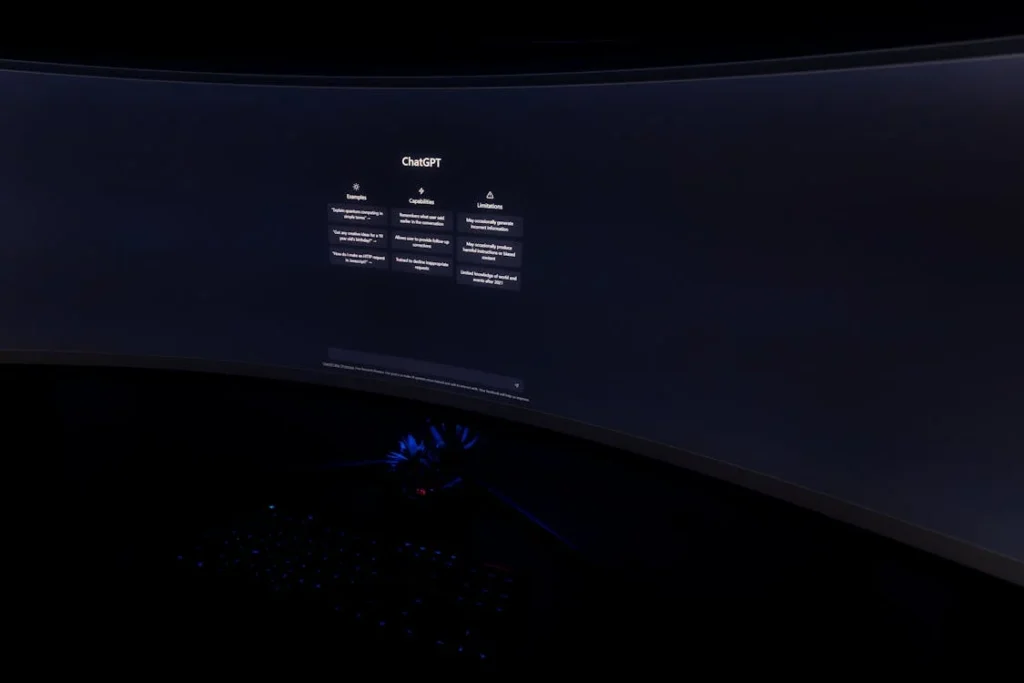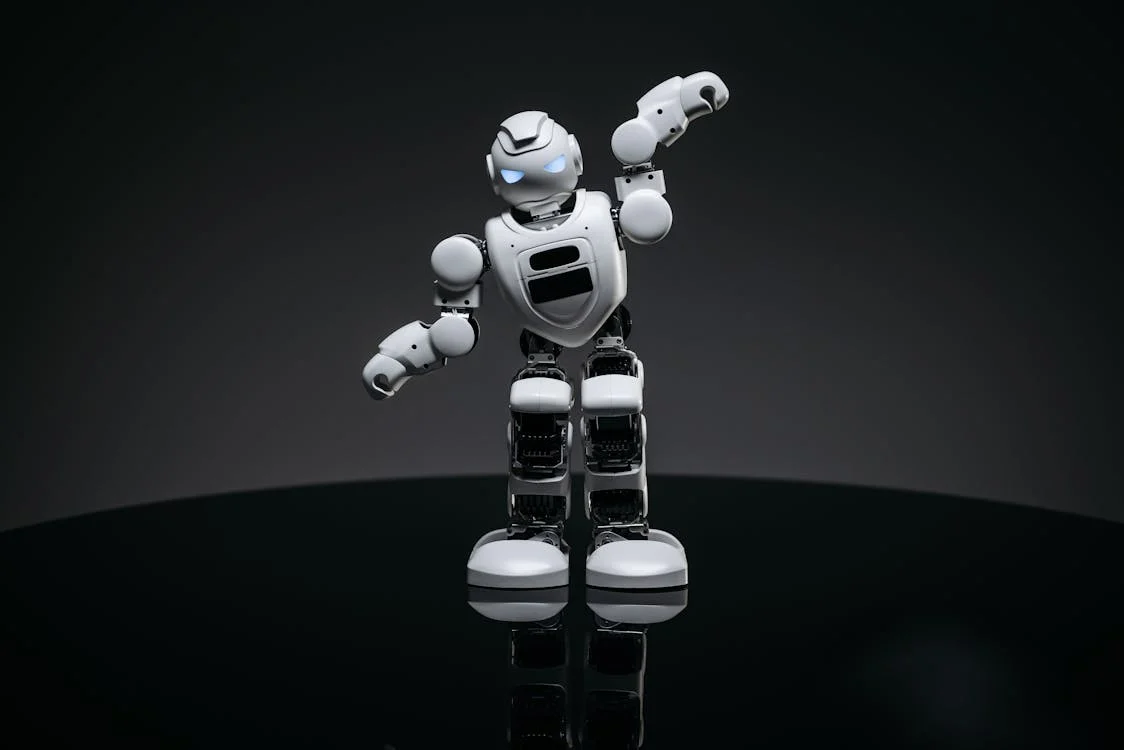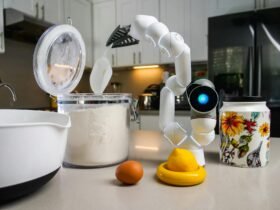Last Updated on January 14, 2025 by Daniele Lima
How AI Automation is Transforming Business in 2025
The Role of AI in Process Automation and Optimization One of the latest advances in artificial intelligence has been the automation of repetitive tasks and the optimization of business processes. Technologies such as machine learning and natural language processing (PNL) allow machines to analyze large volumes of data with precision that was previously only possible by humans.
In industry, for example, AI is used to predict machine failures, avoiding unplanned downtime and high maintenance costs. Manufacturing companies like Siemens and General Electric use AI algorithms to continuously monitor and improve the efficiency of their operations. In the financial sector, the use of AI to automate accounting activities, credit analysis, and fraud detection helps to optimize time and reduce operational costs.
She also applied automation and chain of supplies, optimization logistics, and management of stock. Advanced algorithms can predict fluctuations in demand, adjust production levels, and suggest more efficient delivery routes, saving time and resources. This smart use of data allows companies of all sizes to operate with more speed, reducing human errors and improving forecast accuracy. As a result, operations become more agile, more profitable, and more resilient to changes in do market, creating a significant competitive advantage.
Table of Contents
Latest AI Advances in Healthcare: Diagnosis & Treatment
The application of AI in healthcare is one of the most promising and transformative fields. Today it is possible to use algorithms to analyze medical exams with impressive precision, often surpassing the human eye in detecting diseases. One example is the use of AI to identify early signs of cancer in imaging tests such as mammograms and CT scans, allowing for faster diagnoses and more effective treatments.
Furthermore, artificial intelligence has played a fundamental role in the development of personalized treatments. Using genomic data and patients’ medical histories, machine learning algorithms can help doctors prescribe more effective treatments tailored to each patient’s unique characteristics. This advancement not only improves clinical outcomes but also reduces healthcare system costs by avoiding ineffective treatments.
AI in Self-Driving Cars: Latest Developments 2025

Another area where AI is causing a real revolution is transport, with the development of autonomous vehicles. Cars, drones, and even ships are equipped with intelligent systems that allow them to circulate without human intervention. Companies like Tesla, Waymon (an Alphabet subsidiary), and Uber are at the forefront of this innovation, investing heavily in technologies designed to make roads safer and transportation more efficient.
Autonomous vehicles use a combination of sensors, cameras, radar, and AI algorithms to “see” and “understand” the environment around them. This includes the ability to make real-time decisions such as avoiding obstacles, following traffic signs, and adjusting speed based on road conditions. Although there are still regulatory and technical challenges to overcome, innovations in this field promise to completely change the way we move around cities and significantly reduce the number of accidents caused by human error.
Latest AI Chatbot Advances: Virtual Assistant Technology
Chatbots and virtual assistants such as Siri, Alexa, and Google Assistant are famous examples of how AI is being used in customers’ lives. These systems use natural language processing (PNL) to interact with users in increasingly sophisticated ways, understanding their needs and providing quick and accurate responses.
Companies across industries are using this technology to improve the customer experience. Banks, airlines, and e-commerce platforms, for example, use chatbots to provide 24-hour customer support, reducing wait times and increasing user satisfaction. Furthermore, these virtual assistants are increasingly integrated into our homes, allowing us to control smart home devices with simple voice commands.
How Latest AI Advances Are Changing Jobs
The Transformative Role of AI in the Workplace
With the progress of AI, one of the biggest questions is the impact this technology will have on the job market. While automation can eliminate repetitive tasks, it also creates opportunities in areas such as data science, algorithm development, and AI system maintenance.
AI is also transforming the way we work by enhancing decision-making. For instance, AI software can process large volumes of data in seconds, providing strategic insights that would otherwise take weeks of human analysis.
Key Impacts of AI on Jobs
| Impact | Description |
|---|---|
| Automation of Repetitive Tasks | AI tools handle mundane tasks, freeing employees for more strategic activities. |
| Creation of New Roles | Jobs in AI-related fields like data science, machine learning, and system maintenance are on the rise. |
| Enhanced Decision-Making | AI-driven insights allow businesses to make data-backed decisions faster and with greater accuracy. |
| Increased Productivity | Professionals use AI tools to optimize workflow and improve accuracy, enhancing overall productivity. |
Adapting to an AI-Powered Future
Companies that quickly adapt to this new technological reality enjoy a significant competitive advantage. By investing in AI to optimize processes, enhance customer service, and develop new products, businesses can thrive in an increasingly competitive market.
AI is not about replacing human effort but about augmenting it. Professionals across industries are leveraging AI to boost their efficiency and expand their capabilities.
AI Art & Creativity: Latest Technological Advances
Interestingly, the creative sector has recently benefited from advances in AI. AI programs are used to generate music, visual art, and even movie scripts. Platforms like OpenAI and DeepMind have developed systems capable of learning creative patterns and creating original works, often indistinguishable from those created by humans.
In digital marketing, for example, AI is used to generate quality content, automate advertising campaigns and personalize customer experiences. Using algorithms that understand consumer behavior, companies create highly targeted marketing campaigns, increasing engagement and conversion rates.
AI Ethics: Latest Concerns and Solutions 2025
Despite all the progress, the development of AI presents significant ethical challenges. Data privacy is a growing concern, especially when it comes to systems that rely on large amounts of personal information to function. Additionally, there is concern that algorithms perpetuate existing biases if they are formed based on biased data.
Another crucial point is the impact of AI on the job market. While AI will create new opportunities, it could also replace millions of workers whose jobs will be automated. Ensuring a balance between innovation and social responsibility will be essential for AI to benefit society as a whole.
AI Decision Support Tools
Simplify your AI strategy with these powerful decision-making tools.
AI Solution Selector Tool
Answer a few questions to find the best AI solution for your needs:
Conclusion: A Future Transformed by AI
The latest advances in artificial intelligence are reshaping the healthcare, transportation, and creative industries. As these technologies continue to evolve, they create new opportunities and challenges. Companies and professionals that can adapt to this technological revolution will have the opportunity to thrive in a future increasingly dominated by AI. However, it will be essential for society as a whole to reflect on the ethical and social impacts of these innovations, ensuring that the benefits of AI are widely shared.
Frequently Asked Questions About AI Advances
What are the most important recent advances in AI?
Key advances include improved healthcare diagnostics, autonomous vehicles, advanced chatbots, and AI-powered creative tools. These technologies are transforming industries through better automation and decision-making capabilities.
How is AI changing healthcare?
AI is revolutionizing healthcare through early disease detection, personalized treatment plans, and automated diagnosis. It’s particularly effective in analyzing medical images and predicting patient outcomes.
Will AI replace human jobs?
While AI automates certain tasks, it’s creating new job opportunities in areas like data science, AI development, and system maintenance. The focus is on AI augmenting human capabilities rather than completely replacing workers.
What are the ethical concerns about AI advancement?
The main concerns include data privacy, algorithmic bias, job displacement, and ensuring fair access to AI benefits. There’s also a growing focus on responsible AI development and deployment.
How is AI improving business operations?
AI enhances business through process automation, predictive maintenance, supply chain optimization, and improved customer service via chatbots and virtual assistants.










Leave a Reply